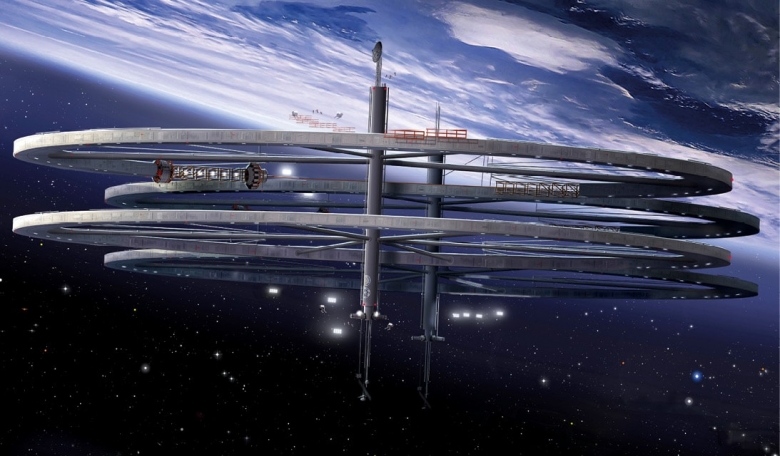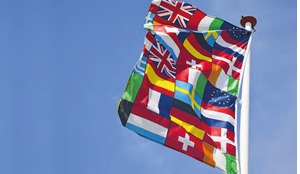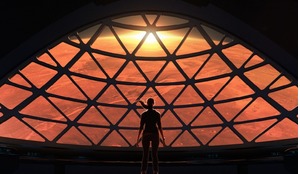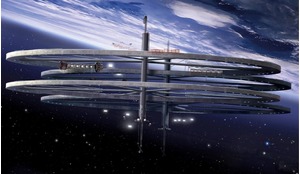After a year of steady and often dramatic progress, mainly through remote digital sessions, the Parliament of Asgardia the Space Nation met physically for the second time in November 2019 - on this occasion in the northern European city of Tallinn, Estonia. Asgardia’s Chair of Parliament, Lembit Öpik, reviews the well-attended sitting and ‘declares an interest’ in the location and the name of the conference venue.
Being an Asgardian Member of Parliament (AMP) mostly involves meeting other Asgardian Members of Parliament via digital platforms. Given the vast number of terrestrial countries represented it simply isn’t feasible to physically get together all the time in a single location. To do so would mean Asgardian politicians spending more time building their Frequent Flyer status than building their political system. So we generally meet on the Internet, using a competent conference platform called Zoom.
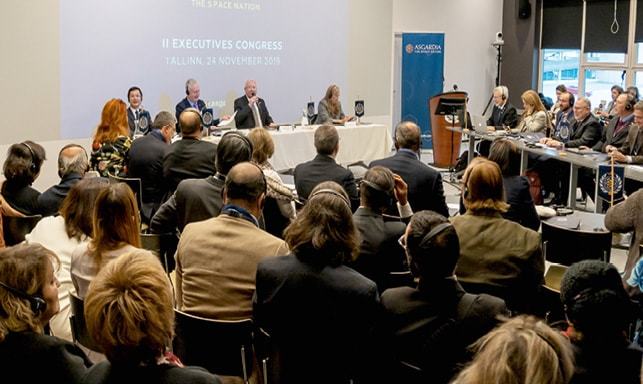 Dr Igor Ashurbeyli speaking at Asgardia’s Second Executive Congress.
Dr Igor Ashurbeyli speaking at Asgardia’s Second Executive Congress.
While this works well most of the time, I’ve always felt strongly that, occasionally, it’s good to talk face to face. There’s no substitute for actual human interaction, instead of contact by electronic means. That’s why, in the Summer Digital Sitting of Asgardia’s Parliament, I put the proposal to meet in person to the vote. Parliament saw the benefit and overwhelmingly endorsed the proposal.
We had just four months to organise the sitting. That’s quite a tall order when you have to arrange for more than 120 people to arrive on time, stay in the same place and discuss things in an effective way at an adequate conference venue. There’s also the question of visas. We’ve been caught out before by the resistance of some nations to allow citizens of other nations to visit them. These are not our fights but they were our problem. If we have a no-show because of some diplomatic difficulty, we’ve got to try and fix that too.
Destination Tallinn
The initial decision was about the choice of venue. My Deputy Chair of Parliament, Ben Dell, plus ever-ready AMP Cheryl Gallagher, did a mass of work to help us decide on the best location. We settled on Tallinn, Estonia. Now, I have to declare an interest here. My heritage and my name are both Estonian. My parents left as children around the time of World War II and I grew up in the UK but I am still very much psychologically and politically associated with Estonia. I’ve also worked there, and I knew this would represent a good option for our venue, based on price, digital excellence and sensitive visa requirements. After consideration, it turned out to be the best option. So that was settled: destination Tallinn.
The conference venue was easier to decide. I happened to know of a great, modern convention centre, which had up-to-the-minute communications facilities and a good price. It also happens to have a most agreeable name: the Öpik Conference Centre. I must confess, it’s not named after me but after my grandfather, the astronomer Ernst Julius Öpik. He did a lot of pioneering work on the solar system. With names like Cosmos and Supernova for meeting rooms it had Asgardia written all over it.
The stage was set for our second Physical Sitting. Note that some detractors of Asgardia never thought we’d even make it this far. So the fact we were there at all was a victory over pessimism.
The agenda itself was based on two parallel strands: the need to make politics happen and the need to make relationships even stronger. It’s worth observing that the second of these came first. AMPs greeted each other in an atmosphere which clearly showed that this was a reunion of old friends, even though most had only met each other physically once before.
It was a resounding confirmation that the nature of Asgardia’s digital democracy had achieved true psychological staying power. These people really did know each other. From a social perspective, we’d achieved something no nascent nation had ever achieved before: actual societal norms and partnerships forged through the medium of the Internet.
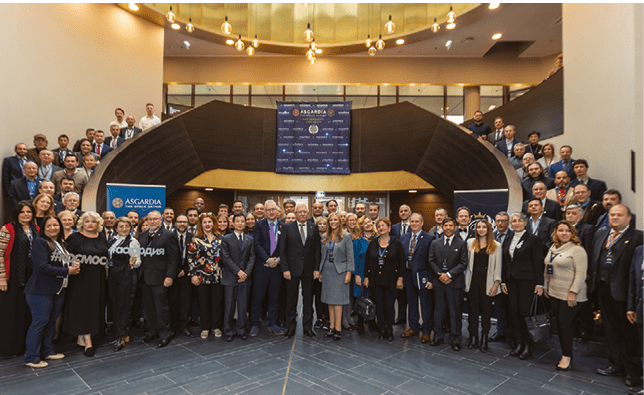 Parliamentarians and government ministers gathered in Estonia.
Parliamentarians and government ministers gathered in Estonia.
Political engagement
Through complex and maturing interactions we’ve built the core team, with the physical meetings forming a vital component in that process
The other aspect of the event was, of course, the political engagement. High on the agenda was debate about igniting the economy of the nation. Our founder and Head of Nation, Dr Igor Ashurbeyli, has repeatedly emphasised the absolutely central importance of operating a viable economic model for the nation.
No country of any size can survive on a handout. It has to give itself a hand up - and that only happens when something occurs in that community to create a surplus. The sitting discussed the elements of a banking system, currency (known as the Solar), business activity and the potential for making a profit in Asgardia.
These debates were called ‘First Readings’. That meant AMPs were free to discuss matters without having to feel constrained by a ‘yes’ or ‘no’ vote. We’ve learned that these more freewheeling discussions are much more effective at delivering a high quality legislative results - a sign of the maturing nature of the Parliament.
Key contributors to these debates included John Fine AMP, the Chair of Trade and Commerce Committee, Alexander Alshvang AMP, Chair of Equity and Resources Committee, Fernando Jimenez MottE AMP, who heads up Manufacturing Committee, and Ben Dell AMP, Deputy Chair of Parliament. Many others had their say as well.
Also high on the agenda was discussion about a citizens’ Bill of Rights, led by Paul Lovette AMP, a key player on the Citizenship Committee. That’s all-important because it’s a cornerstone of what it means to be - and benefit from being - a Citizen. A Civil Service Act was also under discussion, and that received a positive response so it makes its way further along the legislative agenda. All the other committees had their say too, with reports of one sort or another from all 12.
The centrepiece of the Physical Sitting, the Executives Congress, comprising all the Chairs of Committees and Ministers of Government, was convened by Dr Igor Ashurbeyli, the Asgardia Head of Nation. For the first time, Parliament sat in attendance, creating a precedent which is bound to be repeated in future.
Dr Ashurbeyli’s facilitation of the event was itself something of a milestone. It gave the proceedings a very substantial gravitas. This was not a casual conversation. It was a keynote report-back session by the Prime Minister, Ana Mercedes Diaz, the Supreme Justice, Yun Zhao, and myself as Chair of Parliament. It was serious stuff.
In addition, presentations were received from Science Minister Floris Wuyts, who reported on a hugely successful science and investment conference in Germany, and from legal expert Ram Jakhu, who was instrumental in the original creation of the idea of Asgardia. Rounding off the Congress was ROOM’s Managing Editor Clive Simpson.
Socially, the AMPs and Ministers had plenty of time to discuss matters, and life in general, in a series of networking and social events. I made the decision to include more of these than occurred in the first sitting. The idea was to ensure that the rare and precious time together was spent on Asgardia, not sightseeing. I think my tactic worked, because most AMPs and Ministers were together for most of the time.
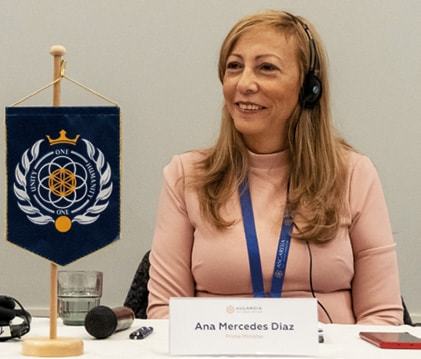 Asgardia Prime Minister Ana Mercedes Diaz.
Asgardia Prime Minister Ana Mercedes Diaz.
Virtual model
Did we make any progress? Most certainly! From the joint Government and Parliament meetings, through to the superb presentations by Estonian officials to illustrate how e-Estonia, the digital face of a whole nation, worked, this was Asgardia at its best. The Estonian model also proves that this country already operates virtually, which is reassuring for Asgardia’s model.
I’d like to meet like this more often. It’s a question of logistics and practicality. I’m already confident that there’ll be another Executives Congress next year, and a Physical Sitting too. They motivate and they cause decisions to be made in a more collective way than would otherwise be the case. Above all, they build a sense of common purpose, cemented by Dr Ashurbeyli’s approach to leading the proceedings at vital times.
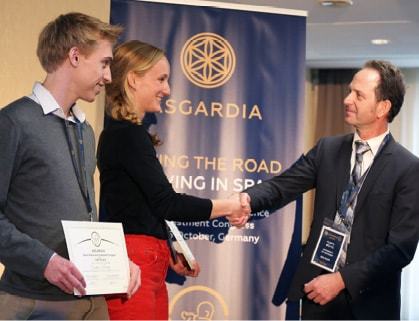 Prof Floris Wuyts, Science Minister, presents awards for the best student contributions at Asgardia’s first Space Science & Investment Congress (ASIC) in October.
Prof Floris Wuyts, Science Minister, presents awards for the best student contributions at Asgardia’s first Space Science & Investment Congress (ASIC) in October.
Foundation stone
What next? Well, let’s take an analogy from the venue. Not many years ago, in honour of my grandfather, I laid the original foundation stone of the Öpik Conference Centre. It’s a fine construction but it is just a building. In a similar way Dr Ashurbeyli has laid the foundation stone for the entire space nation of Asgardia. It’s still under construction, with Government and Parliament leading the team of builders.
Building a nation is a massive task. Through complex and maturing interactions we’ve built the core team, with the physical meetings forming a vital component in that process.
Now, we’ve got to get the economy going; and we’ve got to appeal to a wider community of humans to join us. These are both big challenges. But if it takes just these two major steps to move us towards the next phase, I think we’re doing well, and perhaps rather better than many - even in Asgardia - dared to hope. Parliament and Government can be proud of themselves, and I hope that our Head of Nation is proud of us too.





